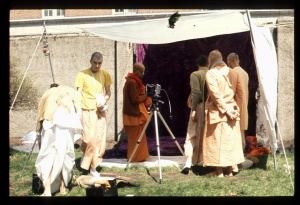SB 8.19.2

A.C. Bhaktivedanta Swami Prabhupada
TEXT 2
- śrī-bhagavān uvāca
- vacas tavaitaj jana-deva sūnṛtaṁ
- kulocitaṁ dharma-yutaṁ yaśas-karam
- yasya pramāṇaṁ bhṛgavaḥ sāmparāye
- pitāmahaḥ kula-vṛddhaḥ praśāntaḥ
SYNONYMS
śrī-bhagavān uvāca — the Supreme Personality of Godhead said; vacaḥ — words; tava — your; etat — this kind of; jana-deva — O King of the people; sū-nṛtam — very true; kula-ucitam — exactly befitting your dynasty; dharma-yutam — completely in accord with the principles of religion; yaśaḥ-karam — fit for spreading your reputation; yasya — of whom; pramāṇam — the evidence; bhṛgavaḥ — the brāhmaṇas of the Bhṛgu dynasty; sāmparāye — in the next world; pitāmahaḥ — your grandfather; kula-vṛddhaḥ — the oldest in the family; praśāntaḥ — very peaceful (Prahlāda Mahārāja).
TRANSLATION
The Supreme Personality of Godhead said: O King, you are indeed exalted because your present advisors are the brāhmaṇas who are descendants of Bhṛgu and because your instructor for your future life is your grandfather, the peaceful and venerable Prahlāda Mahārāja. Your statements are very true, and they completely agree with religious etiquette. They are in keeping with the behavior of your family, and they enhance your reputation.
PURPORT
Prahlāda Mahārāja is a vivid example of a pure devotee. Someone might argue that since Prahlāda Mahārāja, even though very old, was attached to his family, and specifically to his grandson Bali Mahārāja, how could he be an ideal example? Therefore this verse uses the word praśāntaḥ. A devotee is always sober. He is never disturbed by any conditions. Even if a devotee remains in gṛhastha life and does not renounce material possessions, he should still be understood to be praśānta, sober, because of his pure devotion to the Lord. Śrī Caitanya Mahāprabhu therefore said:
- kibā vipra, kibā nyāsī, śūdra kene naya
- yei kṛṣṇa-tattva-vettā, sei 'guru' haya
"Whether one is a brāhmaṇa, a sannyāsī or a śūdra-regardless of what he is-he can become a spiritual master if he knows the science of Kṛṣṇa." (CC Madhya 8.128) Anyone completely aware of the science of Kṛṣṇa, regardless of his status in life, is a guru. Thus Prahlāda Mahārāja is a guru in all circumstances.
Here His Lordship Vāmanadeva also teaches sannyāsīs and brahmacārīs that one should not ask more than necessary. He wanted only three paces of land, although Bali Mahārāja wanted to give Him anything He wanted.